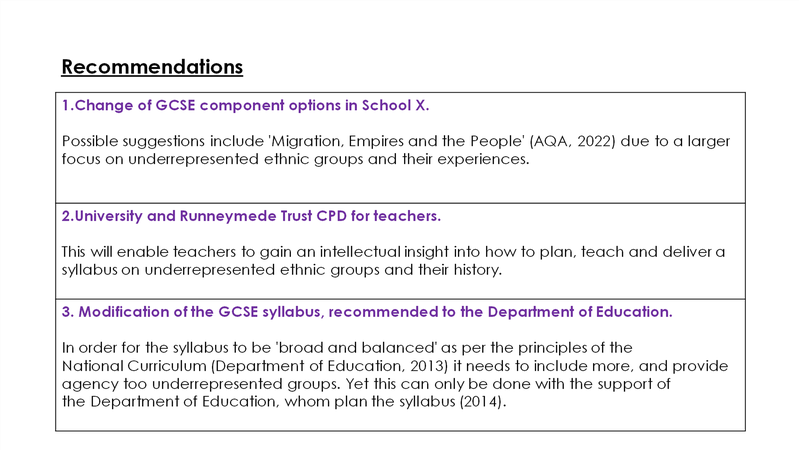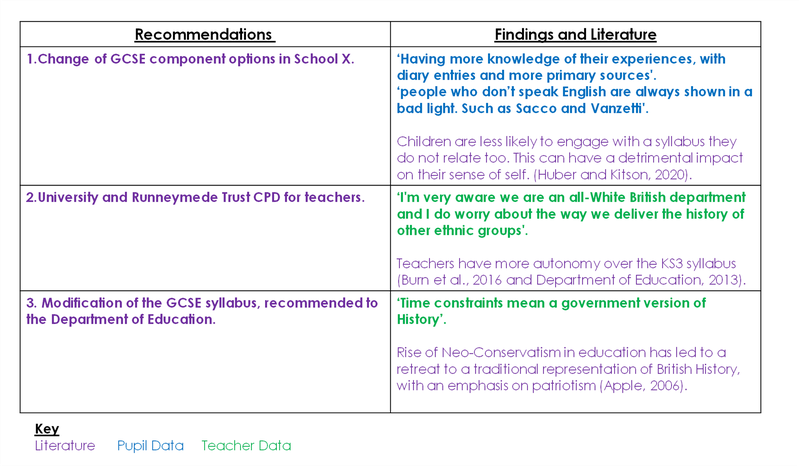To what extent are underrepresented ethnic groups included in the Key Stage Four syllabus and how do teachers and pupils feel about it?
- Qualitative
- Student
- Secondary
- Focus group
- History curriculum
- Education and Language
Within this research the inclusion of underrepresented ethics groups will be explored within the KS4 AQA syllabus (2022). The purpose of this is to assess the impact this is having on the student of history and how both pupils and teachers feel about this, as well as drawing parallels with rising Neo-Conservatism within education. As follows, the research equestions will enable teachers to express their views on the rise of Neo-Convervatism in education through discussion of the “Island Story” of the National Curriculum and alongside pupils, asked to share recommendatons on how to enhance ethnic diverstiy within the syllabus. This research subsequently has concluded that underrepresented ethnic groups have been marginalised within the KS4 syllabus and despite teachers wanting to provide a more inclusive curriculum, ultimately time, subject familiarity and the need to meet the requirements of the GCSE have meant they have fialed to do so. Furthermore, it has also been observed that pupils are aware of the marginalisation of diverse ethnic groups within the KS4 syllabus, and additionally question the represtnative of those briefly included within it. Consequently, this has led to this research demonstrating that teachers need to have greater autonomy and Continued Professional Development opportunities at KS4. These recommendations are also to be made in conjunction with option changes within School X of the Case Study, to meet the interests of the pupils, and the findings shared within the Department of Education to instigate wider syllabus change.
The community which I chose for the focus of this research was School X, a large comprehensive school in Rochdale, Greater Manchester. The rationale behind choosing this community was motivated by practicalities and also my beliefs. From a practical perspective I have worked within School X for two years and worked with GCSE classes since the start, enabling me to gain an understanding of the communities' interests. Yet another key reason for choosing this community is that as a teacher and mixed-race person, I have always focused my research on the inclusion of ethnic minorities and worked upon this area within my PGDE. Thus, I saw this as an opportunity to provide this community with a more inclusive syllabus and gain their perspective of how underrepresented ethnic groups are included at KS4. In order to do this, I will disseminate my research to the Head of the Humanities Faculty and Head of History, who will use the findings to inform the future KS4 syllabus.
The needs of the community addressed within this research is that both pupils and teachers want a more inclusive KS4 syllabus, which provides greater agency for underrepresented ethnic groups. This research suggests that pupils are aware of the importance of including diverse ethnic groups within the syllabus and expressed concern for how pupils would feel if they could not relate to the syllabus. Similarly, teachers expressed a desire to provide a more inclusive history syllabus, as they do at KS3. The implications of this demonstrate that the community is not satisfied with the current syllabus and changes need to be initiated.
The knowledge and recommendations from this research therefore have the ability to change the KS4 syllabus in order to meet the needs of the community. Furthermore, the recommendations have the potential to improve pupil engagement at KS4 and enable teachers to become more knowledgeable in delivering schemes on underrepresented ethnic groups. Consequently, this may lead to increased uptake of the History GCSE and lead to more pupils studying the subject at A Level and degree level. Not only would this meet the needs of the community who already value history as a popular option, it will increase uptake of Higher Education. Although this research focused on History, it may have the potential to influence the inclusion of underrepresented ethnic groups within other subjects. When presenting my findings to the Head of Faculty, it will provide the opportunity to share the results with the leader of Geography and RE, and further diversify the syllabus on a whole school level.
The community will recognise the impact of this research through the changing of options within the KS4 history syllabus. Not only will this meet the needs of the community, it will also encourage other aforementioned departments within the school to consider their inclusion of underrepresented ethnic groups. This would involve teachers and school leaders focusing more upon the stories of underrepresented ethnic groups within syllabuses and assemblies, which would endeavour to meet the needs and interests of the community.


